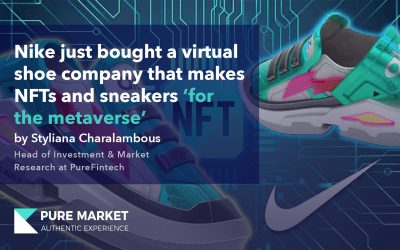What is the Metaverse?
The metaverse is a collective virtual shared space with alternative digital realities where people work, play and socialize. The convergence of virtually augmented physical realities with various virtual worlds and digital avatars is growing and evolving based on the society that contributes to it.
As the metaverse grows, online spaces are created where user interactions are more multidimensional than current technology supports. Instead of viewing only digital content, users in the metaverse will be able to immerse themselves in a space where the digital and physical worlds merge. Eventually, people will be able to enter the metaverse completely virtually (i.e. with virtual reality).
At its heart is the idea that by creating a greater sense of ‘virtual presence,’ online interaction can become much closer to the experience of face-to-face interaction. Interacting in the metaverse will feel way more real for the user than just using the internet.
5 global companies building up the Metaverse
The metaverse is entering into a stage of heavy development. Smaller crypto projects, creators, and games produce content and meta platforms alongside huge tech giants like Google and Facebook (Meta). As the trend has picked up, tech giants with platforms that already complement the metaverse have begun their own developments. Google, for example, is taking a subtle approach that emphasizes augmented reality to connect the digital and real worlds.
Meta, previously known as Facebook, has gone the opposite direction and made obvious moves towards the metaverse. This includes its publicized renaming. The company already owns essential VR hardware and has its cryptocurrency Libra project.
Microsoft is focusing on virtual offices and working environments in the metaverse. Companies will create persistent virtual spaces for their employees to work in and collaborate on a deeper level than standard video calls.
Epic Games has two main metaverse strategies. First, it looks to improve its user experience base and technology to support more players. It also wants to help creators make professional 3D assets for the metaverse.
China’s Tencent is one of the world’s largest video game publishers and messaging service providers. They have publicly mentioned their focus on gaming as an entry point to the metaverse with their already existing technology.
Google Cardboard might be the most successful VR project in history. In 2014, what was then the world’s largest tech firm asked millions of people to strap their smartphone to their face with a piece of cardboard. Google says it shipped “tens of millions” of foldable headsets and Google Cardboard apps were downloaded over 160 million times. It wasn’t the highest-resolution, or high-tech, experience but the strategy helped introduce millions of students and aspiring developers to virtual reality.
It also helped Google pivot from its previous augmented reality experiment, Glass. Today the augmented reality glasses are marketed as a tool for enterprise businesses, but when it launched Google’s expectations were sky high. Literally: The $1,500 product was announced by Google founder Sergey Brin as he jumped out of an airplane.
Glass was essentially the guts of a smartphone with a small camera mounted on a frame of non-prescription glasses. The project flopped, but not before spawning countless memes.
Microsoft
Microsoft announced the Hololens mixed reality glasses in 2015. Rather than flood the consumer market with marketing hype, Microsoft quietly launched Hololens a year later as an industrial manufacturing tool targeted to a select group of enterprise firms. The $3,000 commercial suite shipped with a professional edition of Windows, with extra security features and software to aid application development. The second iteration debuted in 2019 and was slightly more expensive, but had a better set of cameras and lens mounts allowing for more precise operation, and offered a broader range of software capabilities including industrial applications.
Facebook (Meta)
Facebook has easily been one of the loudest voices regarding large-scale metaverse development. The company even changed its name to Meta, showing its seriousness on the topic, with Facebook, Instagram, and Oculus VR all under the brand. It’s obvious that Meta already has ownership of many of the metaverse’s key elements. On a smaller scale, we can already see some of their metaverse developments:
- VR Messaging – important to help connect users in an immersive way
- Project Cambria – a VR headset compatible with the Oculus Quest VR world.
- Horizon Marketplace – a place where buyers, sellers, and creators can exchange digital goods.
CEO Mark Zuckerberg has already noted the importance of Non-Fungible Tokens (NFTs), cryptocurrencies, and blockchains in the metaverse. With its Libra project also underway, we’re likely to see this incorporated into Meta’s future too.
Tencent
Chinese tech giant Tencent Holdings is the world’s largest video gaming firm by revenue and has stakes in major game studios like Epic Games and Activision Blizzard. The South China Morning Post reported this year that Tencent has registered many metaverse-related trademarks for its social site QQ.
Epic Games
Epic is the company behind the video game phenomenon Fortnite, which has moved beyond its core shooting game to social experiences like dance parties and virtual music concerts. Users pay to dress their avatars in different costumes and can build their own islands and games. Epic also owns a large gaming engine, Unreal, used to develop games and other visual effects like TV show backdrops.
Closing thoughts
The race to develop the metaverse is already on the way. But unlike other technologies, there’s a lot of space in the metaverse to innovate without overlapping. After the success seen with crypto and the metaverse, giants like Google and Meta (Facebook) are already looking to incorporate it into their plans. But here is where we might see direct competition between companies with large budgets and small crypto teams. Regardless of who “wins”, innovation and development are likely to be rapid.
We offer trading in crypto CFDs including Bitcoin, Ethereum, Ripple, Litecoin and we many more are on the way! Sign up and start trading now! https://live.crm.puremarketbroker.com/vu/signup
Disclaimer: All writers’ opinions are their own and do not constitute financial advice in any way whatsoever. Nothing published by Pure Market Broker constitutes an investment recommendation, nor should any data or Content published by Pure Market Broker be relied upon for any investment activities.
Pure Market Broker strongly recommends that you perform your own independent research and/or speak with a qualified investment professional before making any financial decisions
Nike just bought a virtual shoe company that makes NFTs and sneakers ‘for the metaverse’
Nike just bought a virtual shoe company that makes NFTs and sneakers ‘for the metaverse’
El Salvador plans to create a ‘Bitcoin City’
El Salvador plans to create a ‘Bitcoin City’
Bitcoin above $64,000 on heels of ETF excitement
Bitcoin above $64,000 on heels of ETF excitement





